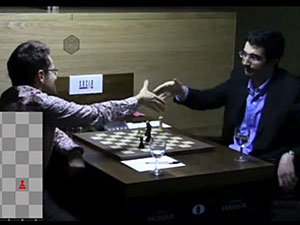


ChessBase 17 - Mega package - Edition 2024
It is the program of choice for anyone who loves the game and wants to know more about it. Start your personal success story with ChessBase and enjoy the game even more.

From March 14 to April 1, 2013, FIDE and AGON – the World Chess Federation’s commercial partner – are staging the 2013 Candidates Tournament for the World Chess Championship 2013. It will be the strongest tournament of its kind in history. The venue is The IET, 2 Savoy Place, London. The Prize Fund to be shared by the players totals €510,000. The winner of the Candidates will become the Challenger to Viswanathan Anand who has reigned as World Champion since 2007. The main sponsor for the Candidates is State Oil Company of the Azerbaijan Republic SOCAR, which has sponsored elite events chess in the past.
There is little question that the 2013 Candidates tournament will be remembered as more than just one of the strongest events in history, it will also be remembered for memorable games, great combativity, and enough drama for a Hollywood blockbuster. Round twelve highlighted this in bright neon letters.
| Round 12 March 29 at 14:00 | ||
|
Magnus Carlsen
|
0-1
|
Vassily Ivanchuk |
|
Boris Gelfand
|
½-½
|
Peter Svidler |
|
Levon Aronian
|
0-1
|
Vladimir Kramnik |
|
Teimour Radjabov
|
½-½
|
Alexander Grischuk |
|
Playchess commentary: GM Daniel King
|
||
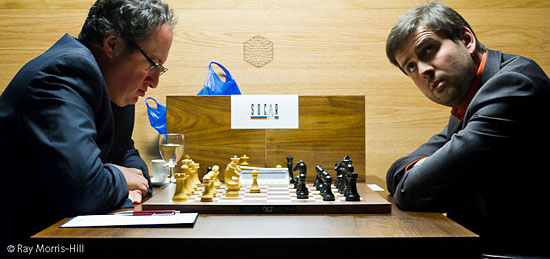
Boris Gelfand, who has had a powerful resurgence in the latter half of the tournament, moving up from the bottom of the field to the middle, showed he was not concerned with his loss to Magnus Carlsen the round before, and played a good game against Peter Svidler. He even had chances to play for a win around move 32, but was unable to find the exact path and eventually the game dissipated into a draw.
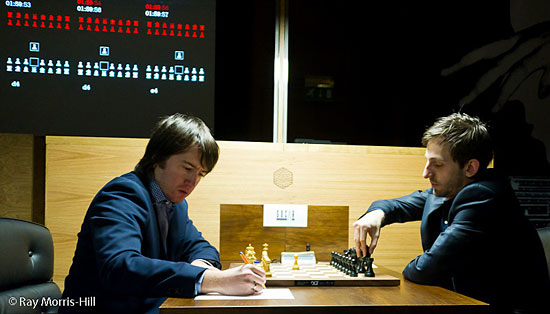
The Azeri Teimour Radjabov also had a long and interesting struggle with Russian Alexander Grischuk. Neither player has really been at his best, enjoying (if one can call it that) see-saw consistency throughout. The players played a Nimzo-Indian Classical, and it was a level affair until a complex not-quite-an-endgame developed in which the Russian made a serious mistake on move 40 and found himself fighting for his life to save the game. With enormous resourcefulness he managed to simplify into a theoretically drawn endgame, fending off Radjabov's king, rook and f- and h-pawns against his king and rook, and saved the half point.
The top boards presented enormous drama that left spectators and pundits glued to their seats as they tried to guess what the results and standings would look like after the end of the round. For most, the true test was the game between Levon Aronian and Vladimir Kramnik, as they both trailed Carlsen and a draw was no good to either. It is worth remembering that for all practical purposes this tournament is a “winner takes all” affair. Though all the participants will certainly earn a prize relative to their standing, only one will challenge World Champion Viswanathan Anand for the crown. That challenge is more than just a place in history, it is a guaranteed share of a million-dollar match.
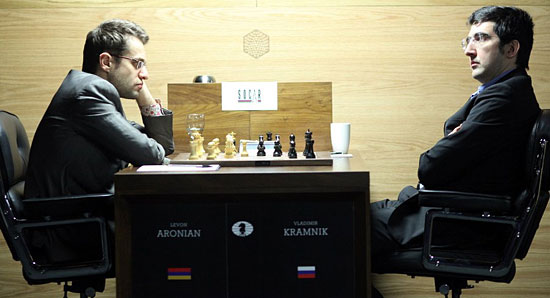
The game started as a Semi-Tarrasch, with both players choosing sensible plans and sequences, abiding to their principled play. The first sign of willingness to break from the status quo was the lone 13…b5 by Vladimir Kramnik, an aggressive and unorthodox way to prevent Bc4 from attacking his queen on d5. This seemed to destabilize the great Armenian player, and Levon Aronian began to lose his way in the highly complex middlegame that ensued. Kramnik seemed on fire and continued to display the magnificent form that has brought him from 1.5 points behind the leaders to just behind Carlsen by half a point. He found the key moves and maneuvered himself into a dead won game, where it seemed as if he had a choice of paths to victory. Sometimes this can be almost fatal to the winning player, even one as vastly experienced as the former World Champion, and imprecision after imprecision he let his opponent back into the game rekindling his hope for a miracle.
By the time they had simplified into an endgame in which the Russian was a piece up, it seemed a mere matter of technique, and carelessly he allowed Aronian to unleash an absolutely fantastic concept. It was based on an idea that every basic endgame manual teaches against. The point is that one is taught that if behind material in an endgame, one should avoid exchanging pieces at all costs. Yet, it was this very contradiction that made it possible, one that will be featured in future endgame manuals. Despite being a bishop down, he forced the exchange of the last rooks, to set up a very sneaky drawing method. The spectators were shocked as the engines all began to report scores of 0.00, predicting a draw. The grandmasters commentating could hardly believe it. Kramnik had blown it. With a win he might tie Carlsen, or even pass him should disaster befall the Norwegian, and now the opportunity had passed. Or had it?
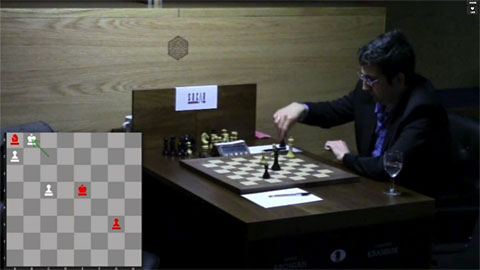
Kramnik executes his final move of the game (as seen in the live feed)
The engines and grandmasters were universal in their opinion. Nearly universal. A certain Super GM commented on Skype (not Garry, as many might think), “I have a very very weird idea that somehow Kramnik is going to win”. This was right after 46…Kd8 when everyone was announcing the split point as a ‘fait-accompli’, a mere formality. Suddenly 50.g6?? appeared on the board, and pandemonium hit the virtual spectators as the engines began spouting mate scores for Kramnik. Yet, it was not quite over even if won. Anyone expecting Levon Aronian, staring at his third straight loss, a disaster in no uncertain terms, to have given up, will want a reality check.
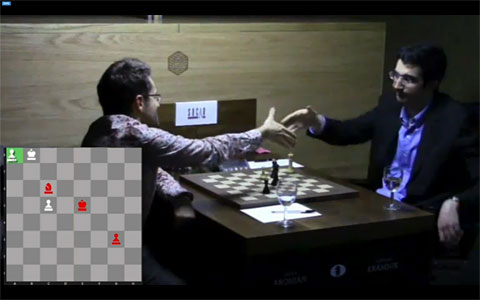
It is to Kramnik’s credit that he understood all too well that a cornered opponent is at his most dangerous, and he carefully sidestepped the very last trap on move 57, where the ‘obvious’ 57…Kd4 would have thrown away the win once more. No such luck and he scored the full point.
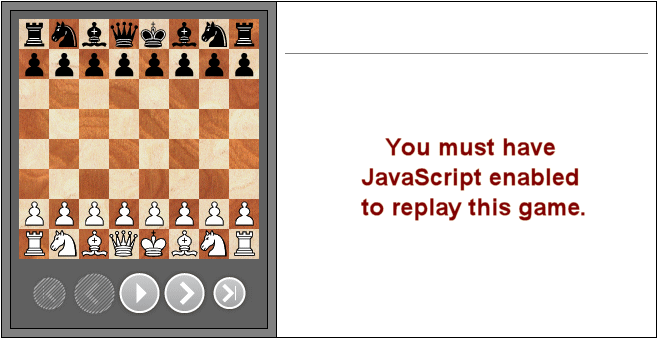
[Event "FIDE Candidates"] [Site "London ENG"] [Date "2013.03.29"] [Round "12"] [White "Aronian, L."] [Black "Kramnik, V."] [Result "0-1"] [ECO "D42"] [WhiteElo "2809"] [BlackElo "2810"] [PlyCount "124"] [EventDate "2013.03.15"] 1. d4 Nf6 2. c4 e6 3. Nf3 d5 4. Nc3 c5 5. cxd5 Nxd5 6. e3 Nc6 7. Bd3 Be7 8. a3 O-O 9. Qc2 cxd4 10. exd4 f5 11. O-O Bf6 12. Nxd5 Qxd5 13. Be3 b5 $5 {Kramnik shows his willingness to bodly play his ideas. This move is both unorthodox and commital, but is certainly effective in preventing Bc4.} 14. Qe2 Bb7 15. Rac1 a6 16. Rfd1 f4 $1 {The game swings in Black's favor now.} 17. Rc5 Qd6 18. Qc2 fxe3 19. Bxh7+ {Seizing his best practical chance.} Kh8 20. fxe3 Ne7 {The engines declare this a blunder in view of Rh5, but the position is insanely complicated.} 21. e4 Rac8 (21... Qf4 {was the simplest and most effective winning move here, but all is forgiven with the combination of stress and looming time-trouble.}) 22. e5 Bxe5 23. Nxe5 Rxc5 24. Ng6+ Nxg6 25. dxc5 Be4 26. Rxd6 Bxc2 27. Bxg6 Bxg6 28. Rxe6 Bd3 29. h4 a5 (29... Rc8) 30. c6 Rf1+ ({ Black misses the most effective reply} 30... Rc8) 31. Kh2 Rc1 32. Re3 Bb1 33. Rc3 $3 {A stunning concept, and brilliant idea.} Rxc3 34. bxc3 Kg8 35. c7 Bf5 36. Kg3 Kf7 37. Kf4 Bc8 38. Kg5 Bd7 39. h5 Be6 40. g3 a4 41. g4 Kf8 42. Kf4 Ke7 43. g5 Kd7 44. Ke5 Bg8 45. c8=Q+ Kxc8 46. Kd6 Kd8 47. Kc6 ({The idea behind his concept is that after} 47. h6 gxh6 48. gxh6 Bh7 49. Kc5 Bd3 50. h7 Bxh7 51. Kxb5 Bc2 {The a-pawn promotes on the wrong-colored square and is thus a draw. However, The path to this idea is not forced.}) 47... Ke7 48. Kxb5 Ke6 49. Kxa4 Kf5 50. g6 $4 {Disaster!} (50. h6 g6 51. Kb5 Kxg5 52. a4 {was a draw.}) 50... Kg5 51. Kb5 Kxh5 52. a4 Kxg6 53. a5 Kf6 54. a6 Bd5 55. c4 Ba8 56. Kb6 Ke5 57. Kc7 g5 $1 {The final trap is avoided.} (57... Kd4 $2 {led to the study-like draw after...} 58. Kd6 $3 Kxc4 (58... g5 $4 {actually wins for *White* after} 59. c5) 59. Ke5 $11) 58. Kb8 Be4 59. Kc7 g4 60. a7 g3 61. c5 Ba8 62. Kb8 Bc6 0-1
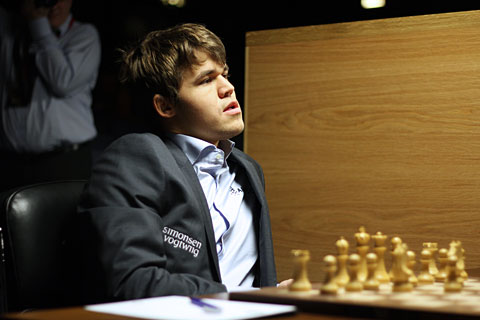
This in itself would have been enough to be the story of the round, with Vladimir Kramnik catching up with Magnus Carlsen, but the day’s drama did not end there. Magnus Carlsen faced Vassily Ivanchuk, and while the Ukrainian is a brilliant player in every sense of the word, he has been unable to solve the Carlsen Dilemna, having wound up with a significantly negative score. The opening was everything Ivanchuk could hope for: a Sicilian Taimanov in which he had all the prospects while White lacked any active plans of his own. To say it was one-sided would be quite unfair since although he had no winning plans of his own, he could certainly neutralize his opponent’s which he seemed to do. At this point, you would be forgiven for expecting to read about a quiet draw, or a miracle win by Carlsen, who cast his magic spell and won a drawn endgame, but today was the exception of exceptions, where even gods are shown to be mortal.
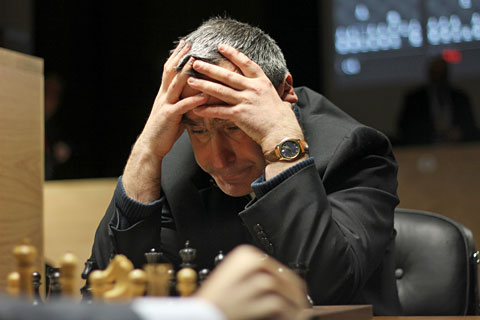
It was perhaps the result of having been forced into passivity throughout the game, or feeling the game held no real danger, but the world number one played the endgame almost lackadaisically, as if no danger could befall him. Vassily Ivanchuk may have sensed this, and continued to milk the position exactly as Magnus had done against so many opponents: patiently working on microscopic advantages, tendering chances for his rival to underestimate the risk. By move 45, it was no longer wishful thinking, and the grandmasters began to wonder whether even Carlsen might not lose this. It seemed unthinkable, but there it was. The Ukrainian never let go. By move 60 it was clearly won, and he made no mistakes in avenging so many losses and key games in the past.
Perhaps the most incredible part was the timing of it all. With this loss, not only does Vladimir Kramnik move into clear first with two rounds to go, but Magnus Carlsen is now second after having led for the entire event. It is worth mentioning one important thing: it is far from over. Those reading Jeff Sonas’s article on his chances to win, will recall some analysis done on a possible comeback by Aronian, second at the time, a half-point behind Carlsen, who were he to equalize with Carlsen, would beat him on tiebreak with a greater number of wins. Magnus Carlsen is now presented with an identical scenario, and should he outscore Kramnik to draw level by the end, he may still snatch the gold in the eleventh hour.
Pictures by Ray Morris-Hill, Anastasiya Karlovich

Statistician Jeff Sonas, who has done some very extensive calculations of the chances of different outcomes, yesterday, after round 11, gave Magnus Carlsen an 87% of winning the Candidates, sent us the odds after round twelve ("if anyone still believes me!").
| Scenario | Likelihood |
| Vladimir Kramnik | 65% chance to win |
| Magnus Carlsen | 35% chance to win |
| Levon Aronian | 7,100 to 1 against |
| Most likely outcomes | |
| Kramnik wins outright |
63%
|
| Carlsen wins from tiebreaker #2 (most wins) |
20%
|
| Carlsen wins outright |
11%
|
| Carlsen wins from tiebreaker #3 (Sonneborn-Berger) | 28 to 1 against |
| Kramnik wins from tiebreaker #3 (Sonneborn-Berger) | 73 to 1 against |
| Rapids | 141 to 1 against |
Full analysis by Jeff will follow tomorrow, which incidentally is a free day at the Candidates.

Select games from the dropdown menu above the board
|
|
||||||||||||||||||||||||||||||||||||
|
|
||||||||||||||||||||||||||||||||||||
|
|
||||||||||||||||||||||||||||||||||||
|
|
||||||||||||||||||||||||||||||||||||
|
|
||||||||||||||||||||||||||||||||||||
|
|
||||||||||||||||||||||||||||||||||||
|
|
||||||||||||||||||||||||||||||||||||
The games start at 14:00h = 2 p.m. London time = 15:00h European time, 17:00h Moscow, 8 a.m. New York. You can find your regional starting time here. Note that Britain and Europe switch to Summer time on March 31, so that the last two rounds will start an hour earlier for places that do not swich or have already done so (e.g. USA). The commentary on Playchess begins one hour after the start of the games and is free for premium members.
LinksThe games will be broadcast live on the official web site and on the chess server Playchess.com. If you are not a member you can download a free Playchess client there and get immediate access. You can also use ChessBase 12 or any of our Fritz compatible chess programs. |